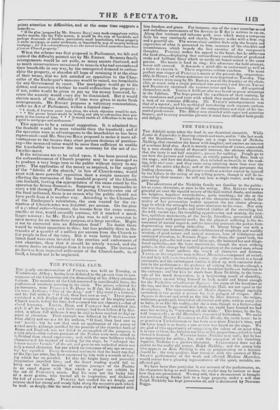THE THEATRES.
THE Adelphi again takes the lead in our theatrical chronicle. While Louise de Liynerolles is drawing crowds and tears, and in " the last week of the Bayaderes," YATES brings out a stage version of Nicholas Nickle5y, that convulses the house with laughter, and excites an interest of a serious kind also. As it is merely a succession of scenes, connected by a very slender thread of dramatic interest, the obvious objection, that the story is not half complete, passes for nothing. People go to see bow the persons and incidents, so vividly painted by Box, look on the stage; and how the dialogue, they relished so heartily in the read- ing, tells vied voce; and they come away admiring more than ever the skill of the artist who drew, arid of the performers who personate the leading characters. Mr. DICKENS'S Credit as a writer caneot be injured by the failure in the acting of any telling points, though it will be in- creased by their success : he will not lose a single reader, and he may gain many. The adventures of the Nickleby family are familiar to the public: let us come, therefore, at once to the acting. Mrs. KEELEY throws a graceful air over the squalid misery of the half-witted &nate, and makes his helpless, hopeless wretchedness, quite touching ; tor she at the same time preserves the simplicity of the character intact : indeed, the reality of her personation makes apparent the too choice phraseo- logy in which the untaught boy gives utterance to his woes. Not only the wan face, rugged locks, and tattered clothes of the starveling, but the wild, vacant eye, the trembling apprehension and anxiety, the rest- less, spiritless movements, of the lonely, friendless, persecuted child, are portrayed with painful truth : but the physical suffering is the de- notement of mental anguish, and its inteusity prevents the pathos from degenerating into puling imbecility. 0. SMITH brings out with a grave, grotesque humour, the odd combination of simplicity and worldly wisdom, of good-nature and cynical manners, love of indulgence and contented privation, in Newman Noyys : the dress, the queer look, the shambling gait—the red nose and blear eye, the battered hat and dilapi- dated umbrella—are the least meritorious, though the most tr striking e
points, in this strange but faithful portraiture of the ruined man, goodness of heart outlives the wreck of character and fortune.
YATES, as the exquisite man- Martalini—eornpouhd of swind- ler and lady. killer—is irresistibly comic: the author's sketch is a broad caricature, and the extravagant outline is filled up with excessive drol- lery in the performance : his pretence of cutting his throat—though a razor is improperly substituted for the breakfasekeife—is ludicrous in the extreme; and the kiss he steals from Kate Nickleby, in the inter- vals of his mock desperation, is a heightening touch of absurdity. IVitetssos; cannot bring himself to look sordid and brutal enough for the Yorkshire settee:Meister &purrs : the scene of the breakfast at the inn, and that in the school at Dotheboys Hall, are not equal to the descriptiou. The representative of Mather &peers, though capitally costumed, is too genial a person for that paragon of viragos. Miss Squeers is dressed and acted to the life by Miss Gowna. :. the vulgar, malicious, gaeeky girl, brimful of affectation and spite, with as many airs as hairs, is so like the reality—for she is one, though in a fiction—that when Newman Noggs reads her letter, we could have fancied we had seen her writing it, "screaming all the while." This letter, by the by, told immensely ; did 111aulalini's coxeomical balderdash. 1Ve must nut overlook Halms' iti.vt.ara,e as John Brodie, the rustic lever: he is as genitive a Yorkshireman as has been seen since EMERY'S time, and Lis horse laugh is as hearty a one as ever was heard on the stage. We are glad of this opportunity of recognizing the talent of an actor who, it is How evident, has hither to not been in his proper line—which is hard clownish humour. J. Wearer it looks Nicholas very well ; but he has no opputtunity for acting ; fur, with the exception of his thrashing queers, Nicholas is a passive character. CULLENFORD does not do justice to the crafty old usurer, Ralph Nichlrby; and the young lady who appears as Kale Niel.hty is not so prepossessing as a heroine should be : the very qualities that interfere with the success of Miss SHAW'S performance of the weak and affected Madame Mantalini, would render her a pleasing representative of the quiet, atniable, wt. affected girl. We bare been thus particular in our account of the performance, as, the characters being so well known, the reader may be curious to bear how they are personated. We may add, that a denouement is brought about, by making Sniike heir to a large property, under a will that Ralph Nickleby has kept possession of, and is discovered by Newman Noggs.


























 Previous page
Previous page